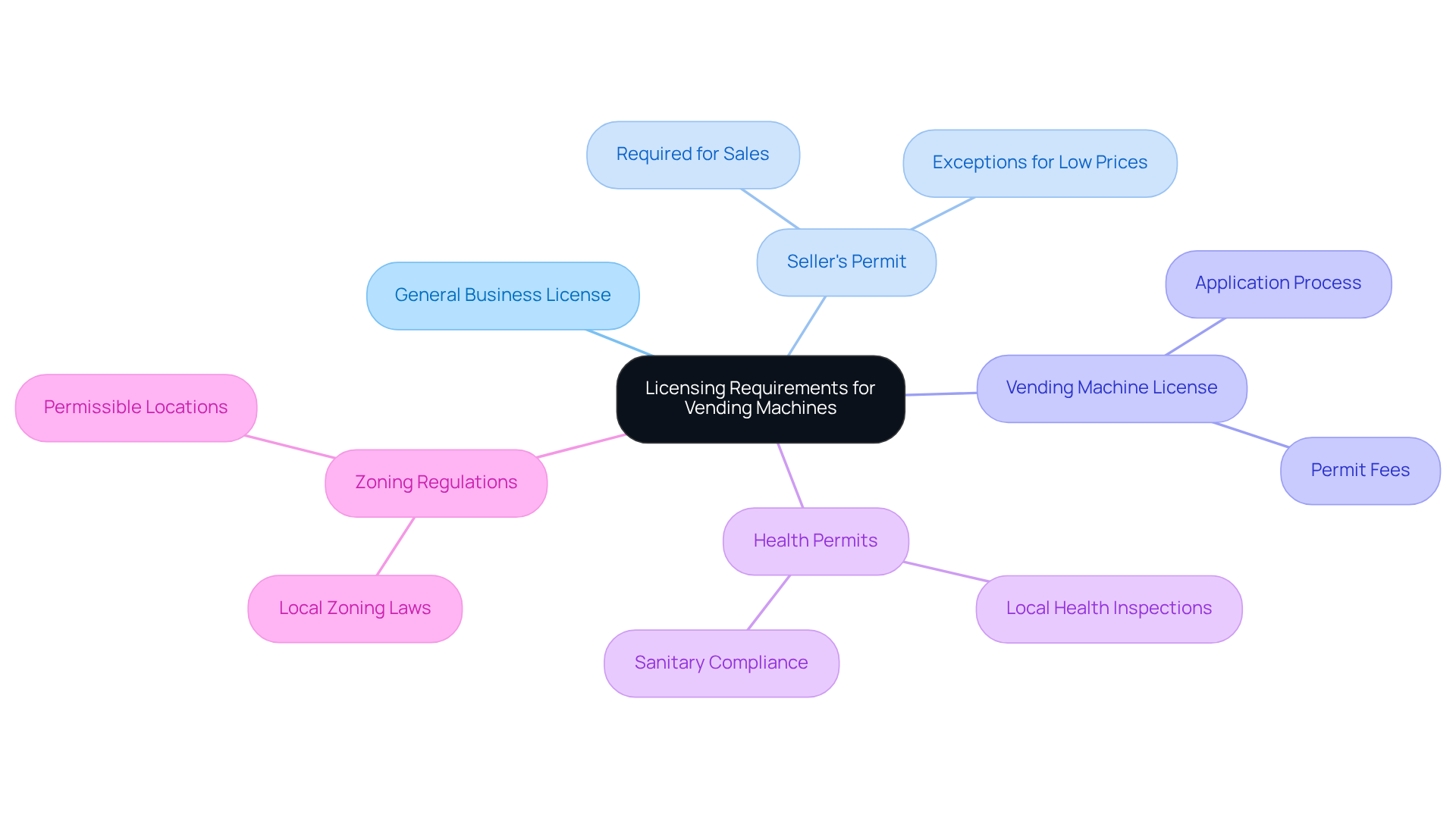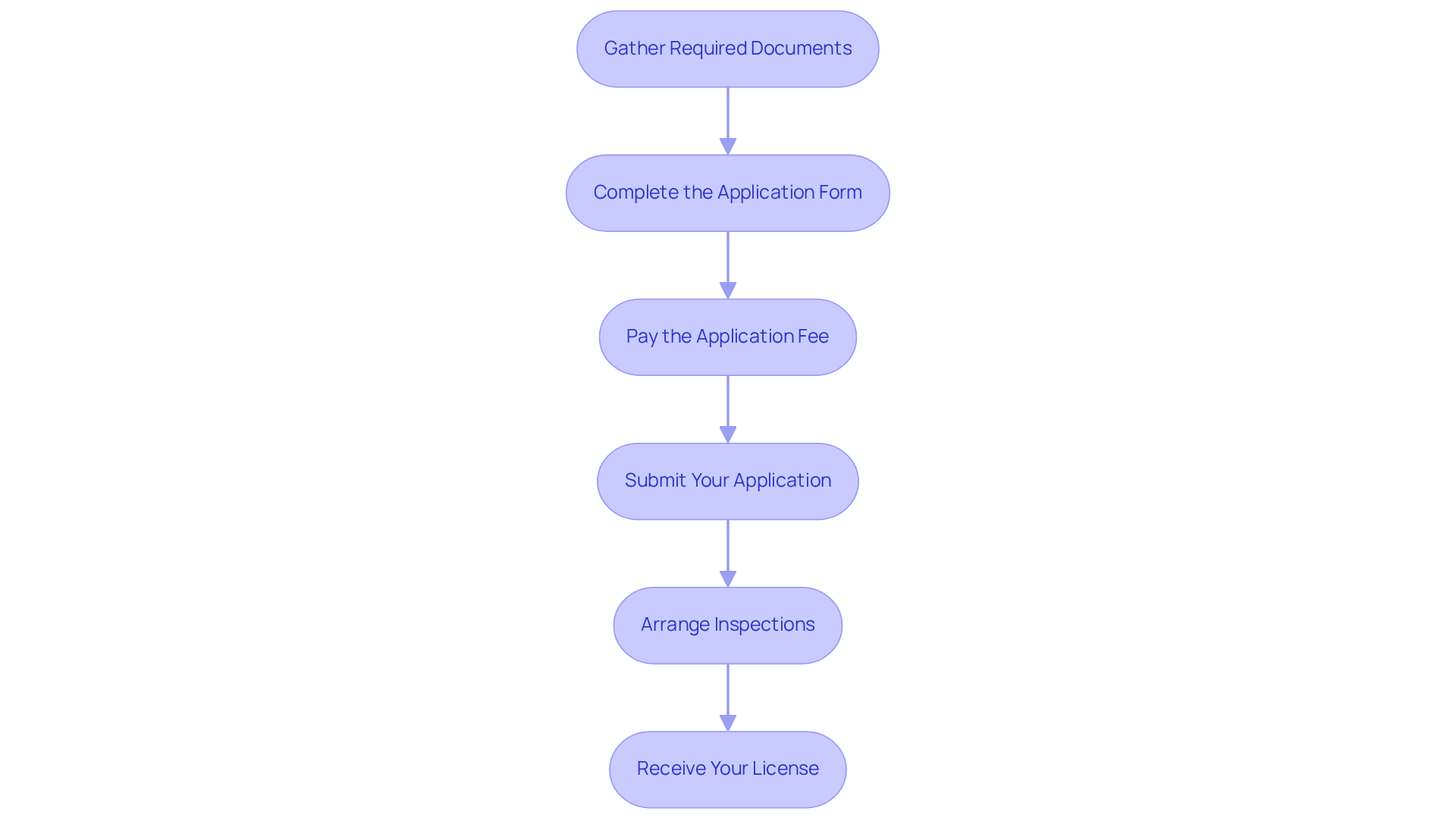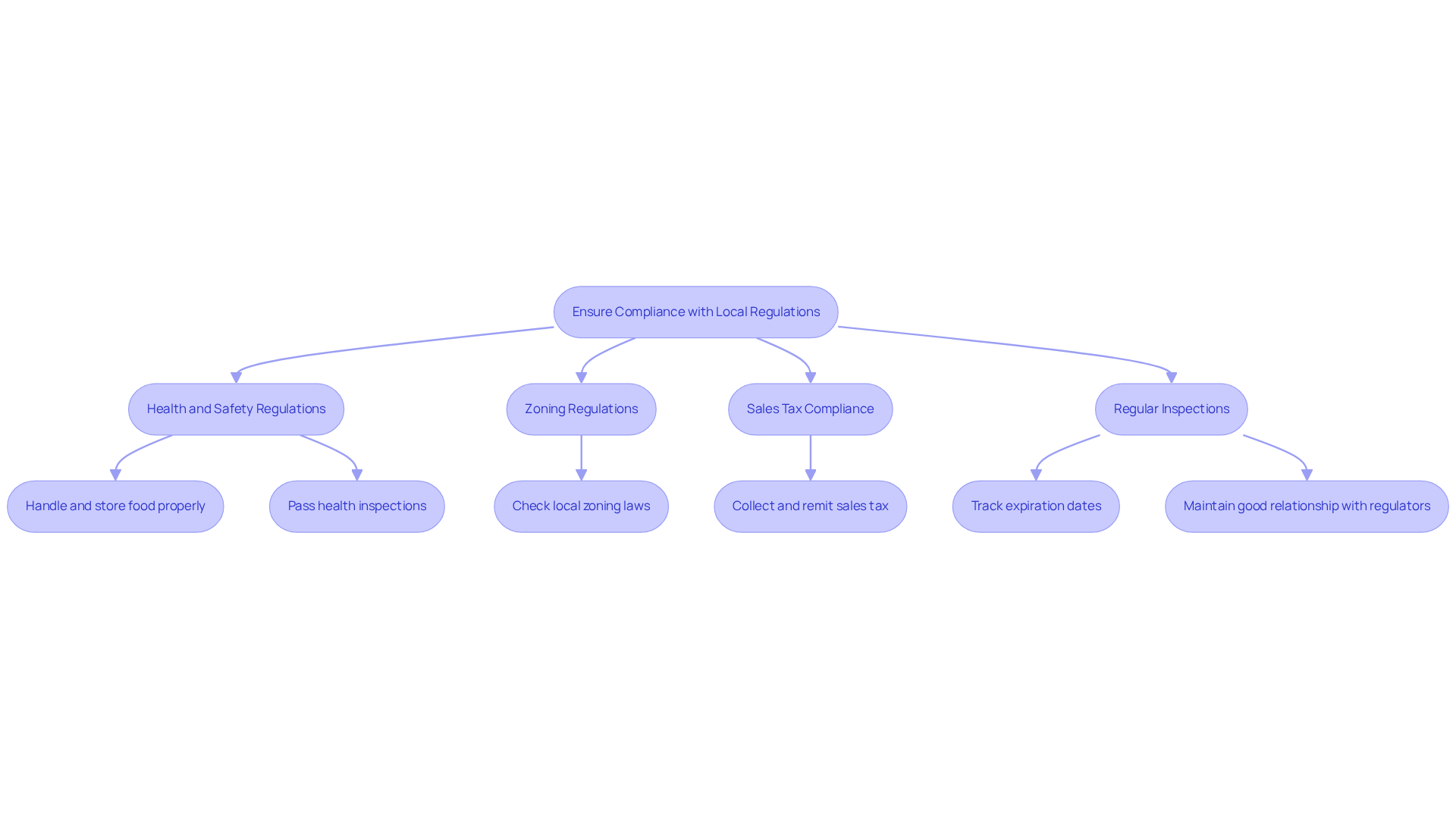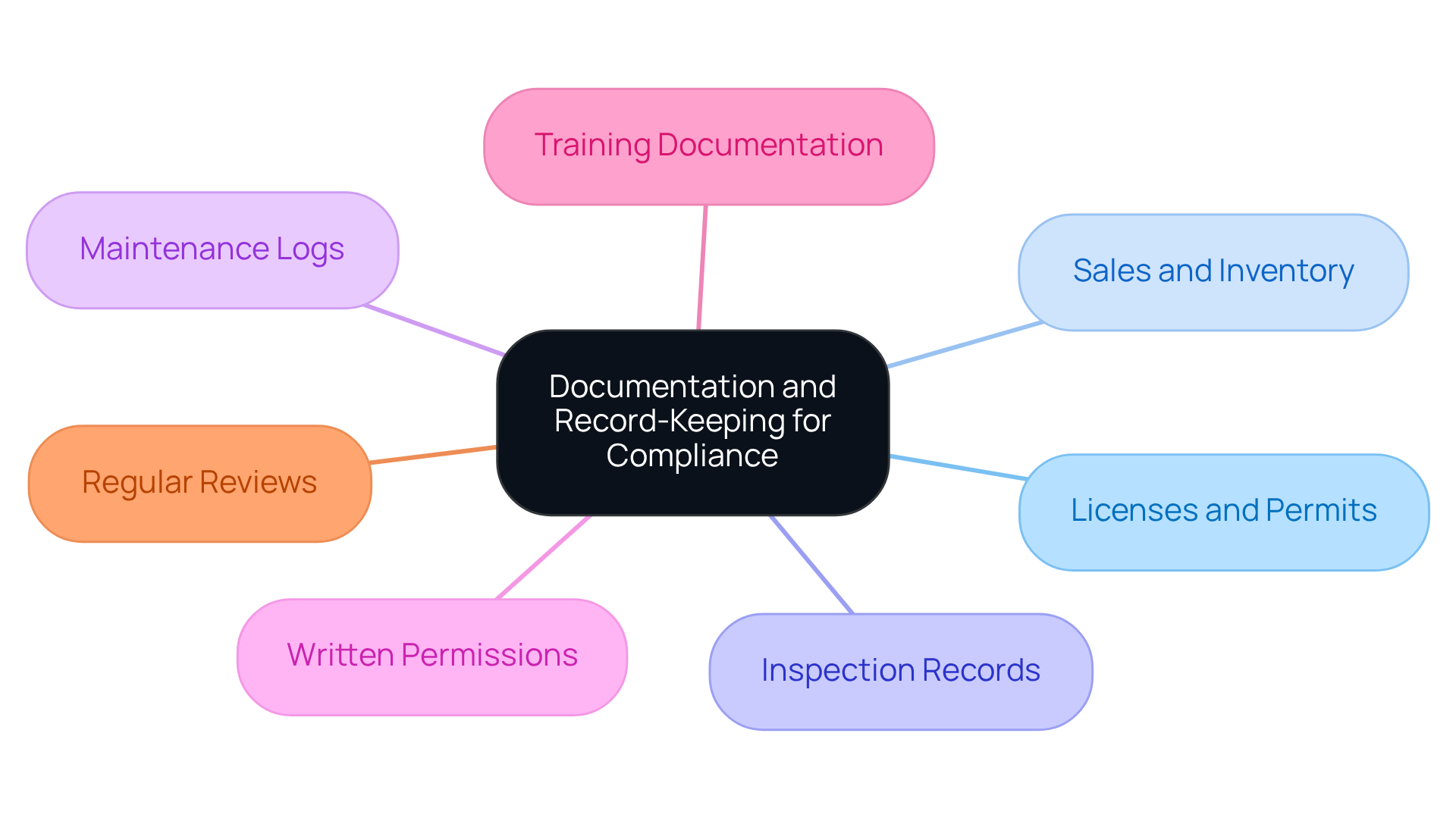Introduction
Starting a vending machine business can be an exciting venture, right? But let’s be real — navigating the maze of licensing requirements can feel pretty daunting. It’s super important to understand the specific permits and regulations that vary by location if you want to succeed.
This article is here to help you out with a comprehensive guide on obtaining the necessary licenses, making sure you’re compliant with local laws, and keeping all your documentation in check. These steps are essential for running a thriving vending operation.
So, what challenges might pop up during the licensing process? And how can you, as an aspiring vending machine entrepreneur, effectively tackle them? Let’s dive in and figure it out together!
Understand Licensing Requirements for Vending Machines
So, you’re thinking about starting your automated retail business? That’s exciting! But before you dive in, let’s chat about something super important: the license for vending machine business and the associated regulations. These can really vary depending on where you are, so it's good to be in the know.
Typically, you’ll need:
- A general business license
- A seller's permit
- A license for vending machine business
If you're planning to sell food items, you might also need some health permits. For instance, in California, obtaining a license for vending machine business involves getting a Seller's Permit from the California Department of Tax and Fee Administration. Most states require vending operators to collect and pay sales tax, so don’t overlook this step.
Now, here’s the thing: you also need to get familiar with local zoning regulations for obtaining a license for vending machine business. These rules will tell you where you can set up your equipment. Staying compliant is key to avoiding fines or any hiccups in your operations.
And don’t forget about regular inspections! If you’re dispensing consumable products, local health departments might want to check in on you. Keeping everything sanitary is crucial.
By doing a bit of research on your local regulations and getting your paperwork in order, you’ll be setting up a solid foundation for your business. This way, you can pave the road to sustainable success. Ready to get started?

Follow the Step-by-Step Application Process
So, you’re thinking about starting a vending machine business? That’s awesome! To get your business license, here’s a straightforward step-by-step process you can follow:
- Gather Required Documents: First things first, collect all the essential documents. You’ll need your business plan, identification, and any previous licenses. Having these on hand makes your application process a lot smoother.
- Complete the Application Form: Next, fill out the application form for your state or locality. Many states even let you submit it online, which is super convenient!
- Pay the Application Fee: Don’t forget about the application fee. This varies depending on where you’re located. For instance, a professional license might cost around $150.
- Submit Your Application: Once you’ve got everything filled out, submit your application along with the necessary documents to your local government office. Double-check that all your info is accurate to avoid any delays.
- Arrange Inspections: If your vending machines will be selling food, you might need to schedule some inspections to meet health regulations. This step is really important to ensure your business is up to safety standards.
- Receive Your License: After your application is reviewed and approved, you’ll get your business license. This gives you the green light to operate your kiosk legally.
Now, here’s something to keep in mind: by 2025, the automated retail sector is expected to keep growing at a solid rate of 7.50% from 2023 to 2032, with North America making up a big chunk of that market. Successful operators always emphasize how crucial it is to prepare thoroughly during the application process for a license for vending machine business — it can really make a difference in how smoothly you obtain your permits.
Also, staying organized and understanding local regulations can really enhance your application experience, making it easier to kick off your business. Plus, if you place your machines in busy spots, they tend to be the most profitable. Did you know the average revenue from a single unit can range from $5 to $100 weekly? So, definitely think about location when you’re applying.
And oh, don’t forget to get your Employer Identification Number (EIN). It’s essential for setting up commercial bank accounts and hiring staff. Good luck with your vending machine venture!

Ensure Compliance with Local Regulations and Permits
Ensuring compliance with local regulations is essential for your retail business, especially when applying for a license for vending machine business to thrive. So, let’s break down some important things to keep in mind:
-
Health and Safety Regulations: If you’re running vending machines that serve food, following health department rules is a must. This means you need to handle and store food properly, pass inspections, and keep an eye on expiration dates to keep your customers safe and build their trust. In 2025, it’s crucial to stay on top of these standards to dodge penalties. States like Vermont and Pennsylvania have specific health regulations for food service that you’ll need to follow.
-
Zoning Regulations: You’ll also want to check that your machines are placed in spots that comply with local zoning laws. The different rules in various areas regarding where you can set up automated sales units can really affect your license for vending machine business. For example, in 2025, cities like Los Angeles charge $71 plus additional fees for each unit you operate, making it clear that a license for vending machine business is crucial to understanding local regulations. Wisconsin has its own fee structure based on how many devices you’re running, which can significantly impact your costs.
-
Sales Tax Compliance: Don’t forget to collect and remit sales tax on your vending machine sales as required by your state. This might mean you need to register for a license for vending machine business, which is essential for operating legally and avoiding fines.
-
Regular Inspections: Be prepared for regular check-ups from local sanitation or business authorities. These inspections are there to ensure you’re meeting safety standards, and being proactive can help you maintain a good relationship with these regulators. For example, you’ll need to keep track of expiration dates and make sure your machines meet health standards to steer clear of penalties.
By focusing on these key areas, you can build a trustworthy and compliant service that meets legal standards and boosts customer confidence. Plus, looking at successful examples like PizzaForno navigating compliance can give you some great insights into best practices in the industry.

Maintain Documentation and Record-Keeping for Compliance
When you're diving into your snack distribution venture, keeping everything organized is key to smooth sailing. Let’s chat about some best practices that can really help you out:
-
Keep Copies of Licenses and Permits: Make sure to store all your business licenses, permits, and any chats with regulatory agencies in one spot. This not only keeps you compliant but also gets you ready for any audits that might pop up.
-
Document Sales and Inventory: Use some handy accounting software or even a simple spreadsheet to track your sales, inventory levels, and expenses tied to your vending machines. Keeping a close eye on this can really boost your financial management and efficiency.
-
Maintain Inspection Records: It’s super important to keep detailed notes on any inspections you have, including reports and any fixes you made. This documentation shows that you’re following health regulations necessary for obtaining a license for vending machine business and can help protect your business from fines.
-
Track Maintenance and Service Logs: Don’t forget to jot down all the maintenance or service work done on your machines. Regular upkeep logs ensure your equipment runs smoothly and safely, which can extend its lifespan and reduce downtime.
-
Ensure Written Permissions: Always double-check that you have written permission from property managers to set up your vending units. This is crucial for keeping everything above board and ensuring smooth operations.
-
Training and Support Documentation: Keep a record of any training from the seller about how to operate and maintain the equipment. This ensures your team is well-informed and can handle the machines efficiently. Also, make sure the seller offers phone support for up to 30 days after the sale, along with any necessary device locks.
-
Review Records Regularly: Set aside time to go over your documentation periodically to ensure everything’s up to date and compliant with changing regulations. Regular check-ups can help you spot areas for improvement and keep you aligned with compliance standards.
By putting these practices into action, you’ll not only boost your compliance but also enhance your overall operational efficiency, paving the way for your vending machine business to thrive.

Conclusion
Starting a vending machine business? It’s all about understanding the licensing landscape and local regulations to keep things running smoothly. By carefully navigating the necessary permits and paperwork, you can lay a solid foundation for your automated retail venture.
First off, you’ll want to grab a general business license, a seller's permit, and any specific licenses for vending operations. Don’t forget to follow health and safety regulations, too. Knowing your local zoning laws and keeping your documentation in order are key to a hassle-free experience. Regular inspections and being on top of sales tax regulations are also crucial—staying informed and organized is the name of the game.
Here’s the thing: launching a successful vending machine business really comes down to being prepared and sticking to local rules. By focusing on compliance and good record-keeping, you can sidestep potential pitfalls and build a trustworthy, profitable business. Embracing these practices will set you up for success in the ever-growing automated retail market. So, are you ready to take that next step?
Frequently Asked Questions
What licenses are typically required to start a vending machine business?
Typically, you’ll need a general business license, a seller's permit, and a specific license for the vending machine business.
Are there additional permits needed if I sell food items through my vending machines?
Yes, if you're planning to sell food items, you might also need health permits, depending on your location.
What is an example of a specific requirement in California for vending machine businesses?
In California, obtaining a license for a vending machine business involves getting a Seller's Permit from the California Department of Tax and Fee Administration.
Do vending operators need to collect sales tax?
Yes, most states require vending operators to collect and pay sales tax.
Why is it important to understand local zoning regulations for a vending machine business?
Local zoning regulations dictate where you can set up your vending machines, and staying compliant is key to avoiding fines or operational issues.
Will my vending machine business be subject to inspections?
Yes, if you are dispensing consumable products, local health departments may conduct regular inspections to ensure sanitary conditions.
How can I prepare for starting a vending machine business?
By researching local regulations and getting your paperwork in order, you can establish a solid foundation for your business and pave the way for sustainable success.
List of Sources
- Understand Licensing Requirements for Vending Machines
- cdtfa.ca.gov (https://cdtfa.ca.gov/formspubs/pub118)
- corpnet.com (https://corpnet.com/business-licenses/vending-machine-and-device-permit)
- How to start a profitable vending machine business | VendSoft (https://vendsoft.com/vending-machine-business-guide)
- Start a Vending Machine Business in 2025 | Nav - Nav (https://nav.com/blog/vending-machine-business-1864566)
- What Permits Do You Need for a Vending Machine Business? (https://dfyvending.com/vending-machine-permits-guide)
- Follow the Step-by-Step Application Process
- Start a Vending Machine Business in 2025 | Nav - Nav (https://nav.com/blog/vending-machine-business-1864566)
- mmaglobal.com (https://mmaglobal.com/case-study-hub/case_studies/view/27294)
- mycompanyworks.com (https://mycompanyworks.com/start-a-vending-machine-business)
- upmetrics.co (https://upmetrics.co/blog/how-to-start-vending-machine-business)
- Vending Machine Statistics and Facts (2025) (https://news.market.us/vending-machine-statistics)
- Ensure Compliance with Local Regulations and Permits
- Do I Need a Permit for a Vending Machine in United States? | PizzaForno (https://pizzaforno.com/blog/permitting-a-vending-machine-united-states)
- afdo.org (https://afdo.org/resources/vending-laws-and-guidance)
- Maintain Documentation and Record-Keeping for Compliance
- 130+ Compliance Statistics & Trends to Know for 2026 (https://secureframe.com/blog/compliance-statistics)
- 100+ Compliance Statistics You Should Know in 2025 (https://sprinto.com/blog/compliance-statistics)
- 115 Compliance Statistics You Need To Know in 2023 - Drata (https://drata.com/blog/compliance-statistics)
- vending.com (https://vending.com/blog/vending-machine-upkeep-part-3-recordkeeping)




